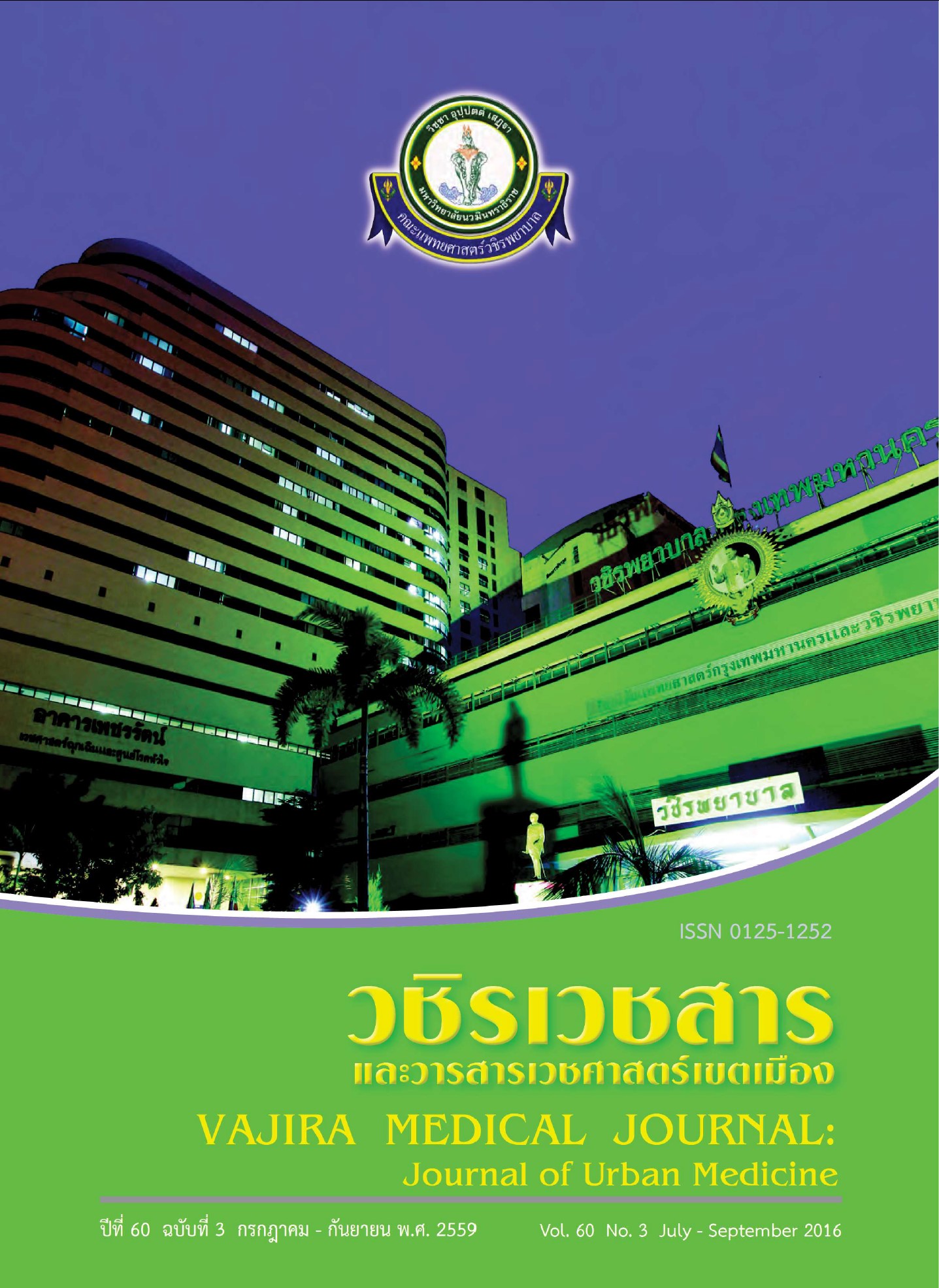Knowledge and Antiretroviral Behaviors among HIV/AIDs Patients at HRH Princess Maha Chakri Sirindhorn Medical Center Hospital
Main Article Content
Abstract
Objective: This study aimed to explore knowledge and antiretroviral use behaviors of HIV patients at HRH Princess Maha Chakri Sirindhorn Medical Center Hospital.
Methods: A cross-sectional descriptive study was performed in 200 HIV patients who underwent antiretroviral therapy for at least 1 month at HRH Princess Maha Chakri Sirindhorn Medical Center Hospital during June 15, 2014 to January 31, 2015. All participants were 18 years or above. Knowledge and antiretroviral behaviors were evaluated by the knowledge questionnaire of AIDs and antiretroviral therapy and the antiretroviral use behavior questionnaire, respectively.
Results: The overall knowledge of AIDs and antiretroviral drugs was classified as intermediate level with the mean score of 29.58 ± 4.93 from total 38 scores and also intermediate level of knowledge in the following domains; AIDs knowledge, antiretroviral agents, knowledge of antiretroviral drugs’ adverse events and management. The mean score of the antiretroviral use behaviors was 96.07 ± 7.87 from total 100 scores. Most participants (79%) had good medication adherence (more than 95%). No relationship was found between the knowledge of AIDs/antiretroviral drugs and the antiretroviral behaviors. Factors affecting antiretroviral behaviors were marital status, education level and adverse events of antiretroviral drugs.
Conclusion: The knowledge of AIDs and antiretroviral drugs in HIV patients at HRH Princess Maha Chakri Sirindhorn Medical Center hospital was in the intermediate level. Most of all had good medication adherence.
Downloads
Article Details
References
2. Bureau of Epidemiology, Ministry of Public Health. Summary report of the prevalence of HIV and AIDs patients in Thailand [internet]. 2012 [cited 2014 Mar 13]. Available from: https://www.boe.moph.go.th/report.php?cat=19&id=1268.
3. Department of Disease Control, Ministry of Public Health. Guide for development of service system and follow-up treatment of HIV and AIDs patients with antiretroviral therapy. Bangkok: JS Printing; 2003.
4. Thummakul D, Kruttakart S, Tepworachai U, Intong Y. Factors affecting the adherence to antiretroviral medicating among HIV/AIDs patients. J Health Sci Res. 2010;4(2):1-11.
5. Yonchoho T. Factors related to the adherence to antiretroviral medication among HIV-infected persons in Bamrasnaradura Infectious Disease Institute [M.S. thesis in Education]. Bangkok: Graduate School, Ramkhamhaeng University; 2005.
6. Maneesriwongul W, Tulathong S, Deekong Y, Williams A. Development of testing of medication adherence measure, AIDs knowledge, and social support among HIV patients treated with antiretroviral agents and caregiver. n.p.; 2003.
7. Maneesriwongul W. Knowledge synthesis about medication adherence of antiretroviral therapy. In: Ningsanon P, Chasombat S, Jirawattanapaisarn T, Maisuwan S, editors. Summarized lesson of promotion of medication adherence in HIV/AIDs patients. Bangkok: The Agricultural Co-operative Federation of Thailand; 2004.
8. Hanvong S. Relationship between selected factors, knowledge and health belief and the adherence to antiretroviral therapy among people living with HIV/AIDs [M.S. thesis in Nursing Science]. Chonburi: Graduate School, Burapha University; 2005.


